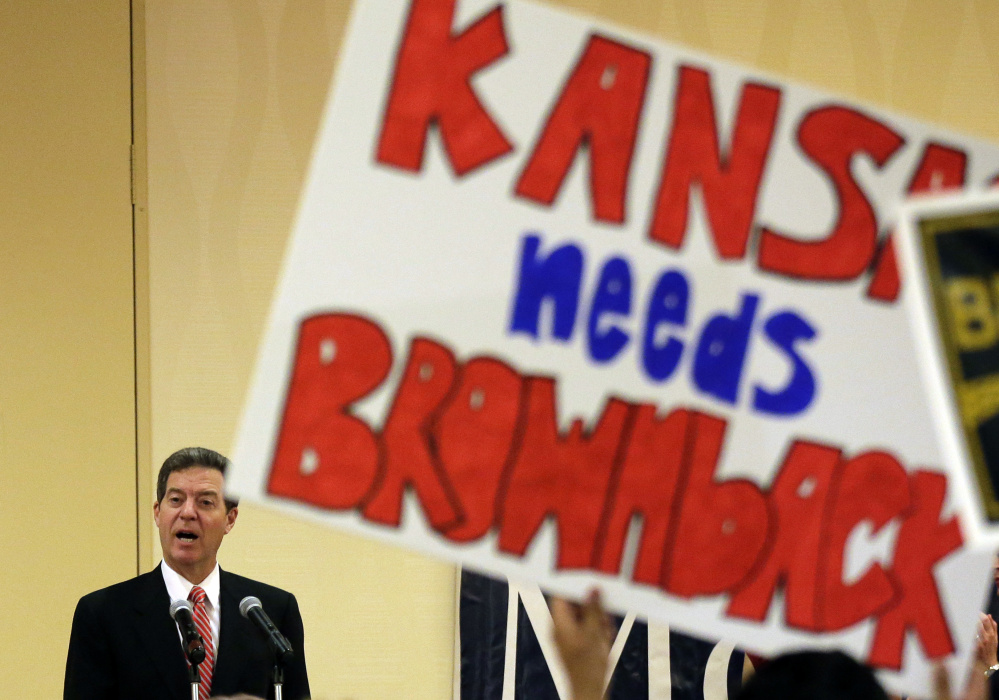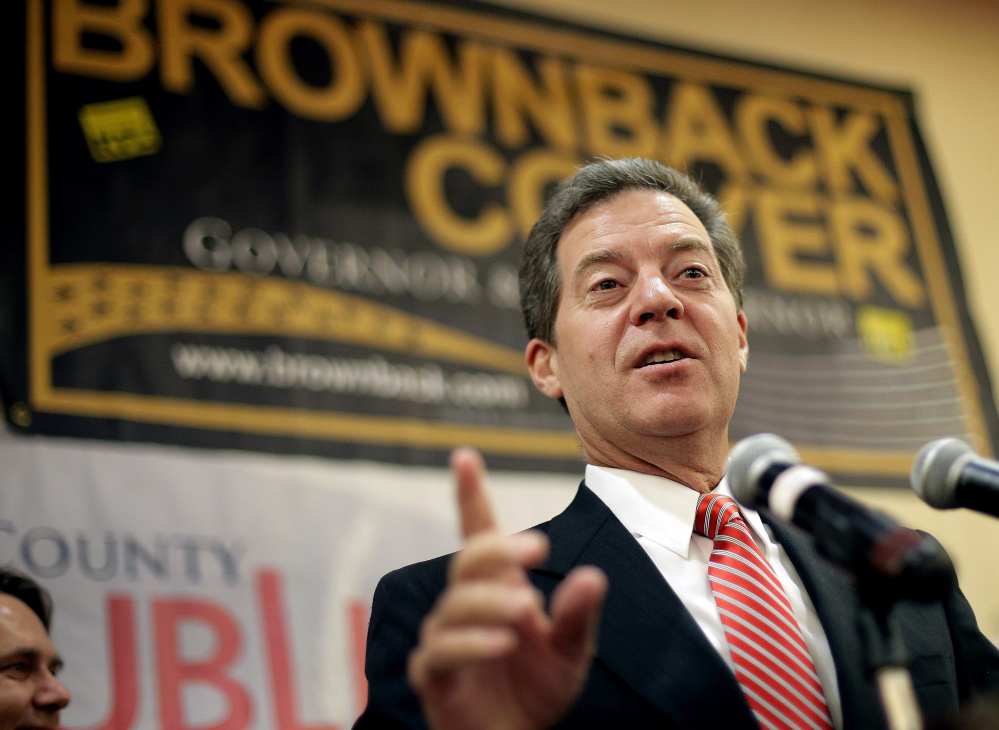OVERLAND PARK, Kan. —Kansas was at the heart of the tea-party revolution, a red state where, six years ago, a deeply conservative group of Republicans took the state for a hard right turn. Now, after their policies failed to produce the results that Republican politicians promised, the state has become host to another revolution: a resurgence of moderate Republicans.
Moderate Republicans joined with Democrats this week to raise state taxes, overriding Republican Gov. Sam Brownback’s veto and repudiating the conservative governor’s platform of ongoing tax cuts. The vote was a demonstration of the moderates’ newfound clout in the state Republican Party. Brownback was unable to successfully block the bill because many die-hard proponents of the tax cut had either retired or been voted out of office, losing to more centrist candidates in Republican primaries.
“The citizens of Kansas have said ‘It’s not working. We don’t like it.’ And they’ve elected new people,” said Sheila Frahm, a centrist Republican who served as lieutenant governor of Kansas and briefly as a U.S. senator.
Kansas’ moderate ascendancies may portend problems for Republicans in Washington, where many in the party, including President Trump, are pushing to adopt federal tax policies similar to the ones Brownback has installed in Kansas. But while Brownback had hoped what he called Kansas’ “real-live experiment” in conservative economic policy would become a national model, it has instead become a cautionary example.
BOOM FAILS TO MATERIALIZE
Brownback and his promised tax cuts would spur enough economic growth to keep the government well funded, but when that economic boom never materialized, state lawmakers faced perennial deficits and had to implement spending reductions to close the gap. And when they did, some lawmakers found that while promises to cut spending play well in a campaign, actually taking away the public services that spending pays for often proves far more unpopular.
“Kansas seems to be ahead of the curve,” said state Rep. Melissa Rooker, a Republican who represents a suburb of Kansas City. “If you look at the national political scene right now, I think it seems to me we’re about ready for a course correction.”
That conclusion will be tested in the upcoming gubernatorial Republican primary, when representatives of the party’s more moderate and more conservative wings will square off to replace Brownback when his term expires.
“Nobody wants to pay more taxes, but they also don’t want to live in a state that is fiscally reckless,” said Republican Ed O’Malley, a former state representative and now a primary candidate.
Kris Kobach, Brownback’s secretary of state, who was once thought likely to join the Trump administration, entered the contest this week and is decrying the new tax increase. “It is time to drain the swamp in Topeka,” he wrote on Twitter on Wednesday, borrowing a phrase from Trump.
“This state does not need more money, and the people of Kansas do not need to keep feeding the government monster with year after year of increased taxes,” Kobach told supporters in a speech announcing his candidacy. “Kansas does not have a revenue problem. Kansas has a spending problem.”
SCHOOLS FEEL THE PAIN
The state’s deep spending cuts to schools and programs aimed at helping the poor have been especially controversial. Michael Speer, a schools superintendent and business manager in Coffeyville – a town near Kansas’ border with Oklahoma – says he previously voted for Brownback, but is now troubled by the changes forced on his profession.
“We’re trying to make all the money stretch as far as it can,” Speer said. “We made a conscious effort to not impact the classroom. But I can’t continue to cut custodial staff.”
“I can no longer support him,” Speer said of Brownback.
The gubernatorial primary will involve competition for voters like Judith Deely. A registered Republican who lives in the Kansas City suburb of Overland Park, Deely said that she was never very interested in politics until she and parents at their local public school started to notice a shift.
The school increased its class sizes and scaled back gifted education. Teachers, worried about their wages and future, began fleeing the school system in Kansas City, Kan., for jobs across the state line in Missouri. Now she is an avid opponent of Brownback’s tax cuts.
“In 2016, enough people woke up and said ‘We have to fix this. The guys in office are refusing to fix this, and come on, the evidence is plain,’ ” she said. “I really don’t care if it’s a Democrat or a Republican, I just want someone reasonable.”
Meanwhile, Brownback’s remaining supporters have been quick to lambaste moderate Kansas Republicans for enacting what they have termed the largest tax increase in state history.
Jeff Glendening, the state director for Americans for Prosperity, pledged retaliation. The conservative organization, funded in part by the wealthy Koch brothers, will campaign against Republican lawmakers who voted to raise taxes, he said.
“We’ll be busy with our activists holding those legislators accountable for raising those taxes,” Glendening said. “This issue is not going to go away.”
“What happens in Kansas breaks so significantly with Republican orthodoxy on taxes,” said Stephen Moore, a former adviser to both Trump and Brownback.
‘WE ARE A TAX-CUTTING PARTY’
“There’s one thing that unifies the Republican Party today more than anything else. We are a tax-cutting party. We are not a tax-increasing party,” Moore said. “I think Republicans across the country have to be paying attention to this.”
The return to more centrist policies could foreshadow trouble for Trump’s tax plan, which is based on the same concepts that guided Brownback’s overhaul beginning in 2012. Trump has proposed reducing the number of different rates on marginal income and setting all of them at lower levels, as Brownback did.
Trump has also proposed slashing taxes for small businesses. Brownback exempted small-business income from taxation entirely, opening what analysts described as a loophole in which individuals represented themselves as small businesses to qualify for the tax break.
Trump has not issued a detailed proposal since taking office, but in April the White House released a one-page document on tax policy that reiterated these basic principles.
The tax cuts for the wealthy frequently advocated by Republican politicians are viewed unfavorably by many voters, polls show. The Public Religion Research Institute, a nonpartisan group that conducts public-opinion surveys, found that 57 percent of Americans nationally, including more than a third of Republicans, support increasing taxes on those earning at least $250,000 a year.
By contrast, Brownback’s policies reduced them drastically.
Send questions/comments to the editors.




